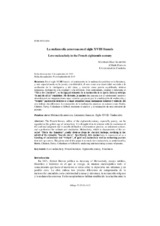La melancolía amorosa en el siglo XVIII francés
Love melancholy in the French eighteenth-century
Autor
Díaz Alarcón, Soledad
Editor
UCOPressFecha
2013Materia
Melancolía amorosaLiteratura francesa
Siglo XVIII
Traducción
Love melancholy
French literature
Eighteenth-century
Translation
METS:
Mostrar el registro METSPREMIS:
Mostrar el registro PREMISMetadatos
Mostrar el registro completo del ítemResumen
En el siglo XVIII francés, el sentimiento de la melancolía prolifera en la literatura, y más especialmente en la poesía, concibiéndola el vate como una emotividad asociada a la exaltación de la inteligencia y del alma, y descrita como pasión equilibrada, tristeza imprecisa, inclinación a la soledad y a la reflexión. Este sentimiento, original e inherente al “Siècle des Lumières”, se desliga parcialmente de la melancolía de la época clásica y anticipa “le mal du siècle” romántico. No obstante, la melancolía causada por el sentimiento amoroso desembocará en interpretaciones muy variadas que pasan por la combinación de melancolía y “volupté”, melancolía dolorosa o el amor entendido como sentimiento doloroso y adorado. En este trabajo describiremos la concepción de la melancolía amorosa en autores como Bertin, Chénier, Parny, Colardeau o Gilbert, mediante el análisis y la traducción de una selección de poemas. The French literary milieu of the eighteenth-century, especially poetry, can be regarded as the golden age of melancholy. It is thought of in its relation with the exaltation of the soul and judgment and is usually defined as a harmonious passion, an unknown sadness, and a preference for solitude and meditation. Melancholy, which is characteristic of the so-called “Siècle des Lumières”, partly divorces from its classical heritage, resulting in the advent of the romantic “mal du siècle”. Specifically, love melancholy is conceived of as a blending of melancholy and “volupté”, of grief and melancholy and an enchanting passion that stirs up sorrow. The prime aim of this paper is to study love melancholy as understood by Bertin, Chénier, Parny, Colardeau or Gilbert by analysing and translating a series of poems.

